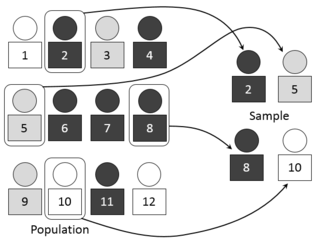
Cluster sampling is a sampling plan used when mutually homogeneous yet internally heterogeneous groupings are evident in a statistical population. It is often used in marketing research. In this sampling plan, the total population is divided into these groups and a simple random sample of the groups is selected. The elements in each cluster are then sampled. If all elements in each sampled cluster are sampled, then this is referred to as a "one-stage" cluster sampling plan. If a simple random subsample of elements is selected within each of these groups, this is referred to as a "two-stage" cluster sampling plan. A common motivation for cluster sampling is to reduce the total number of interviews and costs given the desired accuracy. For a fixed sample size, the expected random error is smaller when most of the variation in the population is present internally within the groups, and not between the groups.
In statistics, sampling bias is a bias in which a sample is collected in such a way that some members of the intended population have a lower sampling probability than others. It results in a biased sample, a non-random sample of a population in which all individuals, or instances, were not equally likely to have been selected. If this is not accounted for, results can be erroneously attributed to the phenomenon under study rather than to the method of sampling.
Statistics is a field of inquiry that studies the collection, analysis, interpretation, and presentation of data. It is applicable to a wide variety of academic disciplines, from the physical and social sciences to the humanities; it is also used and misused for making informed decisions in all areas of business and government.
Confirmation bias is the tendency to search for, interpret, favor, and recall information in a way that affirms one's prior beliefs or hypotheses. It is a type of cognitive bias and a systematic error of inductive reasoning. People display this bias when they gather or remember information selectively, or when they interpret it in a biased way. The effect is stronger for desired outcomes, for emotionally charged issues, and for deeply-entrenched beliefs.
Epidemiology is the study and analysis of the distribution, patterns and determinants of health and disease conditions in defined populations.

In statistics, quality assurance, and survey methodology, sampling is the selection of a subset of individuals from within a statistical population to estimate characteristics of the whole population. Statisticians attempt for the samples to represent the population in question. Two advantages of sampling are lower cost and faster data collection than measuring the entire population.

An opinion poll, often simply referred to as a poll or a survey, is a human research survey of public opinion from a particular sample. Opinion polls are usually designed to represent the opinions of a population by conducting a series of questions and then extrapolating generalities in ratio or within confidence intervals.
Social research is a research conducted by social scientists following a systematic plan. Social research methodologies can be classified as quantitative and qualitative.
Selection bias is the bias introduced by the selection of individuals, groups or data for analysis in such a way that proper randomization is not achieved, thereby ensuring that the sample obtained is not representative of the population intended to be analyzed. It is sometimes referred to as the selection effect. The phrase "selection bias" most often refers to the distortion of a statistical analysis, resulting from the method of collecting samples. If the selection bias is not taken into account, then some conclusions of the study may be false.
The availability heuristic is a mental shortcut that relies on immediate examples that come to a given person's mind when evaluating a specific topic, concept, method or decision. The availability heuristic operates on the notion that if something can be recalled, it must be important, or at least more important than alternative solutions which are not as readily recalled. Subsequently, under the availability heuristic, people tend to heavily weigh their judgments toward more recent information, making new opinions biased toward that latest news.
Publication bias is a type of bias that occurs in published academic research. It occurs when the outcome of an experiment or research study influences the decision whether to publish or otherwise distribute it. Publishing only results that show a significant finding disturbs the balance of findings, and inserts bias in favor of positive results. The study of publication bias is an important topic in metascience.

IQ and the Wealth of Nations is a 2002 book by psychologist Richard Lynn and political scientist Tatu Vanhanen. The authors argue that differences in national income are correlated with differences in the average national intelligence quotient (IQ). They further argue that differences in average national IQs constitute one important factor, but not the only one, contributing to differences in national wealth and rates of economic growth.
Bias is an inclination towards something, or a predisposition, partiality, prejudice, preference, or predilection.
External validity is the validity of applying the conclusions of a scientific study outside the context of that study. In other words, it is the extent to which the results of a study can be generalized to and across other situations, people, stimuli, and times. In contrast, internal validity is the validity of conclusions drawn within the context of a particular study. Because general conclusions are almost always a goal in research, external validity is an important property of any study. Mathematical analysis of external validity concerns a determination of whether generalization across heterogeneous populations is feasible, and devising statistical and computational methods that produce valid generalizations.

Chuño is a freeze-dried potato product traditionally made by Quechua and Aymara communities of Bolivia and Peru, and is known in various countries of South America, including Argentina, Bolivia, Chile and Peru. It is a five-day process, obtained by exposing a frost-resistant variety of potatoes to the very low night temperatures of the Andean Altiplano, freezing them, and subsequently exposing them to the intense sunlight of the day. The word comes from Quechua ch'uñu, meaning 'frozen potato'.
An open-access poll is a type of opinion poll in which a nonprobability sample of participants self-select into participation. The term includes call-in, mail-in, and some online polls.
Objectivity in science is an attempt to uncover truths about the natural world by eliminating personal biases, emotions, and false beliefs. It is often linked to observation as part of the scientific method. It is thus intimately related to the aim of testability and reproducibility. To be considered objective, the results of measurement must be communicated from person to person, and then demonstrated for third parties, as an advance in a collective understanding of the world. Such demonstrable knowledge has ordinarily conferred demonstrable powers of prediction or technology.
In fields such as epidemiology, social sciences, psychology and statistics, an observational study draws inferences from a sample to a population where the independent variable is not under the control of the researcher because of ethical concerns or logistical constraints. One common observational study is about the possible effect of a treatment on subjects, where the assignment of subjects into a treated group versus a control group is outside the control of the investigator. This is in contrast with experiments, such as randomized controlled trials, where each subject is randomly assigned to a treated group or a control group.
Heuristics are simple strategies to form judgments and make decisions by focusing on the most relevant aspects of a complex problem. As far as we know, animals have always relied on heuristics to solve adaptive problems, and so have humans.
The GESIS – Leibniz Institute for the Social Sciences headquartered in Mannheim with a location in Cologne is the largest German infrastructure institute for the social sciences. With basic research-based services and consulting covering all levels of the scientific process, GESIS supports researchers in the social sciences. As of 2017, the president of GESIS is Christof Wolf.










